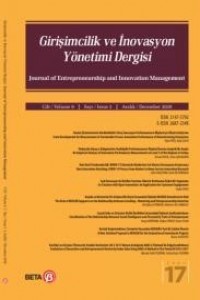İmalat İşletmelerinin Sürdürülebilir Süreç İnovasyon Performansının Ölçümü için Ölçek Geliştirme
Sürdürülebilir Süreç İnovasyonu, Ölçek Geliştirme, Ölçüm Modeli, AFA, DFA
Scale Development for Measurement of Sustainable Process Innovation Performance of Manufacturing Enterprises
Sustainable Process Innovation, Scale Development, Measurement Model, EFA, CFA,
___
- Ar, I.M. (2012), “The impact of green product innovation on firm performance and competitive capability: the moderating role of managerial environmental concern”, Procedia - Social and Behavioral Sciences, 62, 854-864.
- Arundel, A., René Kemp (2009), “Measuring eco-innovation”, Maastricht, The Netherlands: UNI-MERIT Research Memorandum.
- Basso, L.F.C., David Ferreira Lopes Santos, Herbert Kimura, Ana Carolina Simões Braga (2013), “Eco-Innovation in Brazil. The Creation of an Index”, The Business & Management Review, 4(1), 2-17.
- Cai, W., Guangpei Li (2018), “The drivers of eco-innovation and its impact on performance: Evidence from China”, Journal of Cleaner Production, 176, 110-118.
- Calik, E., Fazleena Badurdeen (2016), “A measurement scale to evaluate sustainable innovation performance in manufacturing organizations”, Procedia CIRP, 40, 449-454.
- Calik, E., Fethi Calisir (2019), “The mediating effect of the innovation process on the relationships among innovation components: an empirical study on Turkish companies”, International Journal of Technology, Policy and Management, 19(1), 72-88.
- Chen, Y.-S., Shyh-Bao Lai, Chao-Tung Wen (2006), “The Influence of Green Innovation Performance on Corporate Advantage in Taiwan”, Journal of Business Ethics, 67(4), 331-339.
- Chen, Y.-S. (2008), “The Driver of Green Innovation and Green Image: Green Core Competence”, Journal of Business Ethics, 81(3), 531-543.
- Cheng, C.C., Eric Shiu (2012), “Validation of a proposed instrument for measuring eco-innovation: An implementation perspective”, Technovation, 32(6), 329–344.
- Delmas, M.A., Sanja Pekovic (2018), “Corporate Sustainable Innovation and Employee Behavior”, Journal of Business Ethics, 150(4), 1071–1088.
- De Marchi, V. (2012), “Environmental innovation and R&D cooperation: Empirical evidence from Spanish manufacturing firms”, Research Policy, 41(3), 614–623. doi:10.1016/j.respol.2011.10.002
- De Medeiros, J.F., Jose Luis Duarte Ribeiro, Marcelo Nogueira Cortimiglia (2014), “Success factors for environmentally sustainable product innovation: a systematic literature review”, Journal of Cleaner Production, 65, 76–86. doi:10.1016/j.jclepro.2013.08.035
- García-Granero, E.M., Laura Piedra-Muñoz, Emilio Galdeano-Gómez (2018), “Eco-innovation measurement: A review of firm performance indicators”, Journal of Cleaner Production, 191, 304-317.
- Gaskin, J. (2012), Validity master, Stats Tools Package. http://statwiki.kolobkreations.com. (Erişim:22.10.2019).
- Hair, Joseph, William Black, Barry Babin, Rolph Anderson (2014), Multivariate Data Analysis, 7th ed., New Jersey: Pearson Prentice-Hall.
- Ketata, I., Wolfgang Sofka, Christoph Grimpe (2015), “The role of internal capabilities and firms’ environment for sustainable innovation: evidence for Germany”, R&D Management, 45(1), 60–75.
- Klewitz, J., Erik Hansen, (2014), “Sustainability-oriented innovation of SMEs: A systematic review”, Journal of Cleaner Production, 65, 57–75. doi:10.1016/j.jclepro.2013.07.017
- Kline, Rex (2016), Principles and practice of structural equation modeling, 4th ed.,New York: The Guilford Press.
- Leal-Rodríguez, A.L., Antonio Ariza-Montes, Emilio Morales-Fernández, Gema Albort-Morant (2018), “Green innovation, indeed a cornerstone in linking market requests and business performance. Evidence from the Spanish automotive components industry”, Technological Forecasting & Social Change, 129, 185-193.
- Liao, Z. (2016), “Temporal cognition, environmental innovation, and the competitive advantage of enterprises”, Journal of Cleaner Production, 135, 1045-1053.
- Lopez-Valeiras, E., Jacobo Gomez-Conde, David Naranjo-Gil (2015), “Sustainable Innovation, Management Accounting and Control Systems, and International Performance”, Sustainability, 7(3), 3479–3492.
- Ma, Y., Guisheng Hou, Baogui Xin (2017), “Green Process Innovation and Innovation Benefit: The Mediating Effect of Firm Image”, Sustainability, 9, 1778.
- OECD ve Eurostat (2005), Oslo manual: Guidelines for collecting and interpreting innovation data, 3rd Edition, The Measurement of Scientific and Technological Activities. Paris: OECD.
- Raykov, Tenko ve George Marcoulides (2008), An Introduction to Applied Multivariate Analysis, New York: Routledge.
- Schiederig, T., Frank Tietze, Cornelius Herstatt (2011), “What is green Innovation? A quantitative literature review”, Working Paper, No. 63, Hamburg University of Technology (TUHH), Hamburg: Institute for Technology and Innovation Management (TIM).
- Singh, M.P., Arpita Chakraborty, Mousumi Roy (2016), “The link among innovation drivers, green innovation and business performance: empirical evidence from a developing economy”, World Review of Science, Technology and Sustainable Development, 12(4), 316-334.
- Tumelero, C., Roberto Sbragia, Steve Evans (2019), “Cooperation in R & D and eco-innovations: The role in companies’ socioeconomic performance”, Journal of Cleaner Production, 207, 1138–1149.
- Varadarajan, R. (2017), “Innovating for sustainability: a framework for sustainable innovations and a model of sustainable innovations orientation”, Journal of the Academy of Marketing Science, 45, 14-36.
- Worthington, R.L., Tiffany Whittaker (2006), “Scale Development Research: A Content Analysis and Recommendations for Best Practices”, The Counseling Psychologist, 34(6), 806–838.
- Wu, G.-C. (2017), “Effects of Socially Responsible Supplier Development and Sustainability-Oriented Innovation on Sustainable Development: Empirical Evidence from SMEs”, Corporate Social Responsibility and Environmental Management, 24(6), 661–675.
- Zhang, Y., Jun Sun, Zhaojun Yang, Shurong Li (2018), “Organizational Learning and Green Innovation: Does Environmental Proactivity Matter?”, Sustainability, 10(10), 3737.
- ISSN: 2147-5792
- Başlangıç: 2012
- Yayıncı: Beta Basım Yayım Dağıtım A.Ş.
Proje Değerlendirme Sistemleri Açısından KOSGEB’e Yeni Bir Çözüm Önerisi
Yeni Nesil Perakendecilik: KOVID-19 Sürecinde Marketten Eve Hizmet İnovasyonu Araştırması
Selin GENÇTÜRK, Yücel ÖZTÜRKOĞLU
İmalat İşletmelerinin Sürdürülebilir Süreç İnovasyon Performansının Ölçümü için Ölçek Geliştirme
Açık İnovasyon ile Birlikte Yaratma: Tüketici Katılımına İlişkin Bir Uygulama
Bahadır Fatih Yıldırım YILDIRIM, Sultan Kuzu YILDIRIM
Sosyal Zeka ve Girişimci Kişilik Özellikleri Arasındaki İlişkinin Sınıflandırılması
Koray GÜRPINAR, Volkan YÜNCÜ, Yunus YILAN
Koçluk ve Mentorluk ile Girişimcilik Niyeti Arasındaki İlişkide KOSGEB Desteklerinin Rolü
Ali Şükrü ÇETİNKAYA, Mehmet Ali CANBOLAT
Türkiye’de Düzey 2 Bölgelerinin Yenilikçilik Performansının Ölçümü Üzerine Ampirik Bir Analiz
